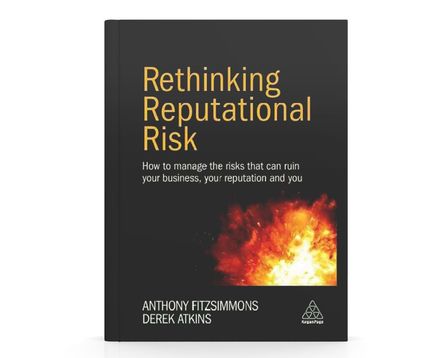 Book review by Felix Kloman.
Book review by Felix Kloman. Fitzsimons and Atkins, two UK-based insurance and management consultants explore the frightening inability of most organizations to pay serious attention to their reputations. “A good reputation is valuable”, they write. I’d go much farther: it is essential, True, how does one “measure” a reputation, since it is composed of the mental images of both groups and individuals, changing every moment? Can you ever assign a financial value? But this exploration is worth a serious read. First, it acknowledges the importance of reputation. Second, it places stress on understanding behavioral economics, including its biases and heuristics. Third, it emphasizes the primary role of a Chief Risk officer as a ”listener” rather than an advocate.
The chapters are brief and punchy, concluding with thoughtful “questions to mull.” The authors cite numerous behavioral writers, including Ariely, Thaler, Sunstein, Kahneman, Tversky, Gigerenzer, and Tetlock & Gardner (whose Superforecasting was assigned reading for this group!). The middle section includes seven “case studies on BP (Texas City and Deepwater Horizon), Tesco, AIG, EADS Airbus A-380, Barclays Bank (LIBOR), VW, and Stafford Hospital. I wish they had dissected Wells Fargo, a continuing disaster! But each dissects failure: they offer no examples of successful reputation enhancement!
But the dominant theme is negative: avoid situations that can erode reputation. The authors define reputational risk as “the risk of failure to fulfill expectations of your stakeholders in terms of performance and behavior.” This attitude, of course, dominates “risk management thinking” today: look only at the downside, a result, perhaps, of the completely negative use of the word “risk”.
They also acknowledge “risk management isn’t new. It’s been an evolutionary force beyond human memory”, but they over-focus on its largely English insurance history from the later 1970s. Strangely, they make no mention whatsoever of the Society for Risk Analysis, COSO, or all the permutations of ISO. In addition, while emphasizing the importance of “stakeholders” in creating and maintaining reputation, they offer no ideas for how we ought to communicate with their wide range. Shouldn’t organizations create and maintain continuous two-way dialogues with all stakeholder groups? With today’s social media, this is now a practical idea.
That immortal comment from Cool Hand Luke (1967) applies: “What we’ve got here is a failure to communicate!”
Unfortunately, sales pitches inevitably creep into the text. The authors are owners of a UK management consultancy titled Reputability LLP. Every so often they encourage retaining an “independent observer.” But not “remuneration consultants” whose “independence and incentives should be studied carefully before reliance is put on what they advise.”
But a quote from Warren Buffett sums up this entire book: “We can afford to lose money – even a lot of money. But we can’t afford to lose reputation – even a shred of reputation. We must continue to measure every act against not only what is legal but also what we would be happy to have written about on the front page of a national newspaper in an article written by an unfriendly but intelligent reporter.”
Worth a serious read!
Felix Kloman
Email: [email protected]


 RSS Feed
RSS Feed